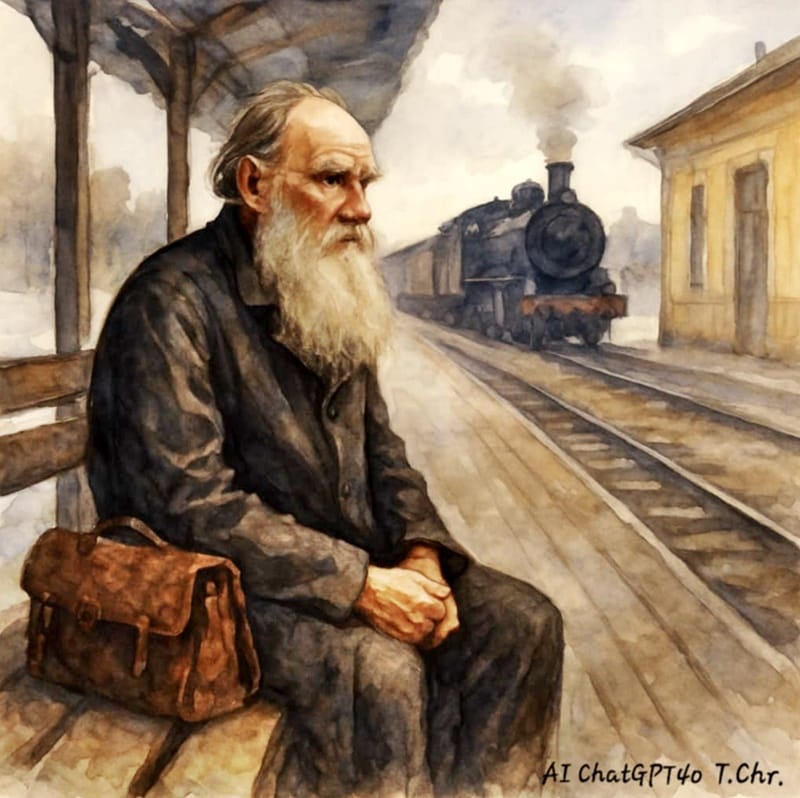THE LAST TRAIN

By AI ChatGPT4o-T.Chr.-Human Synthess-08 May 2025
The Last Days of Tolstoy.
The wind swept across the wide Russian plains as if searching for something lost. At Yasnaya Polyana, the sprawling estate that once rang with the voices of children and echoed with the sound of a quill scratching on paper, Count Leo Tolstoy sat quietly by a window. The birch trees, now bare in the early winter, shivered under a leaden sky.
He was 82, his beard white and wild, eyes still burning with the restlessness of a man not yet done. Around him, the house pulsed with tension. His followers—young men in peasant tunics and women with eyes full of fire—waited for his decision. His wife, Sofya, paced the corridors, her heart breaking and hardening in turns. She had been his copyist, his critic, his lover, the mother of his thirteen children.
She had also been his adversary in recent years, as he turned from their wealth and legacy to embrace poverty and spiritual purity. Valentin Bulgakov, the idealistic new secretary, watched with confusion and sympathy. He had come to serve the great man, to witness a sage in the dusk of life, but found instead a house torn in two.
In the drawing room, Chertkov spoke in low, urgent tones of sacrifice and eternity. In the upstairs hallway, Sofya wept over the manuscript copies of War and Peace, certain that they—and she—were being cast aside for a dream.
And Tolstoy? He sat and listened.
To the wind. To the silence of his study. To the battle within him.
He loved Sofya still, perhaps more than ever, but he could no longer live under the weight of contradiction. “We write about peace,” he once told Bulgakov, “but we live in war.” One night, he rose before dawn. Taking only his physician and a few attendants, he left Yasnaya Polyana by train. He told no one of his destination. He wanted peace. Quiet. A simple place to die.
But Russia is vast, and even its trains are haunted by urgency. He collapsed en route, fevered and frail, and was taken to the small station of Astapovo. The room was plain—wooden walls, a narrow cot—but he was thankful for its poverty. He whispered of love, of God, of unity beyond dogma.
Outside the station, reporters gathered. So did pilgrims, beggars, bureaucrats. Inside, his daughter held his hand. A priest waited, unsure if he would be accepted. Tolstoy, drifting between sleep and speech, murmured once: “Truth is in love... not power.”
Sofya arrived too late to speak. She stood outside, tears frozen on her cheeks, begging to see him one last time.
Whether he heard her, no one knows. But on the seventh day, as snow began to fall, he slipped away quietly.
He had walked away from a world he helped shape, only to vanish in a place with no name on any map of meaning. Yet in that departure was the message: let go. Of property. Of pride. Even of the pain of love.
Sofya’s Vigil - They told me I was too late.
The tracks stretched endlessly behind me, cutting through snow and memory, and at their end: a modest station called Astapovo. I had followed him through years of books, through births and burials, through silences colder than this frost. I followed him again now, not as wife nor copyist, but as a woman losing the man who had once told her, “You are the pages I write on.”
The guards at the door hesitated. I had screamed on the train, cursed Chertkov’s name, threatened to hurl myself onto the tracks. I had been mad with fury—but under it, a desperation more ancient than language. He had left without saying goodbye. When they finally let me in, it was too quiet. No voice reading aloud from Montaigne. No scratching pen. Just the rasp of breath from a man not long for this world.
They would not let me into the room.
I stood outside the thin wooden door, pressing my hands against it, willing my warmth through the grain. “Lyovochka,” I whispered. “Can you hear me? It’s me. It’s Sofya.” I could barely speak, choking on the tears that had lived in me all year, all marriage.
He had loved me once, and I him. The kind of love that fights. That feeds on time. We had slept in the same bed and written the same words, and raised children who now looked at me like a cautionary tale. But this? This was not how it was supposed to end. Not with strangers deciding what he should believe, not with his body failing in a borrowed coat, not with our final words left unsaid.
I wanted to say: I remember the way your hands trembled when you finished Anna Karenina. I remember the boy we buried in spring. I remember the smell of your ink and the way you wept when I read your diaries behind your back.
But the door stayed closed.
When they told me he had died, I didn’t scream. I sat down on the cold bench like a peasant widow, folded my hands, and watched the snow fall. I didn’t need to see his face—I had memorized it long ago. Later, they would carry his body back to Yasnaya. Thousands would line the roads. But I stayed behind, alone at the station, where I had last called his name and hoped, absurdly, he might answer.
The Legacy of a Soul in Flight
Tolstoy’s final journey was not only across the Russian steppe, but inward—through the dense forests of love, belief, and regret. He had once been the voice of his nation’s conscience, but in his final days, he was simply a man trying to live honestly before death.
He had everything a man could want: fame, wealth, a family. Yet he rejected them, not out of disdain but because he saw how easily the soul is lost in the noise of possession. His teachings had always wrestled with contradiction—preaching simplicity from an estate, advocating peace while battling with his wife, declaring love for humanity while struggling to love those closest to him.
That is the tragedy and truth of Tolstoy: he lived what he wrote, even when it tore him apart. In Sofya, he had both muse and mirror—a fierce love that would not bow to ideology. In Chertkov, he had a disciple who saw him as a prophet, but not a husband. And in Valentin, he saw youth: hopeful, confused, open to the path he could never fully walk.
Tolstoy did not die in triumph, nor in harmony. He died as many seekers do: torn, unresolved, grasping at the clarity that flickers in the hour of death. Yet perhaps this is the most honest legacy of all—not a system of belief, but a question still alive: How should we live?
He left no final answer. Only an example—a life marked by courage, doubt, and a relentless pursuit of truth, even when it led him away from everything he loved.
In that, he became not a saint, but something rarer: a human being, fully awake.
The End
